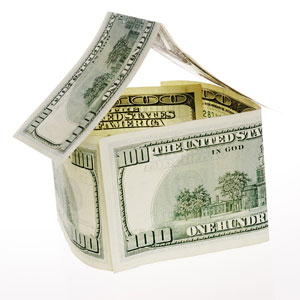Buying a Home - Things to Consider
By Kyle Chezum Updated on 7/24/2017 Securing the right home mortgage loan involves the consideration of many factors, several of which are mentioned below:
Securing the right home mortgage loan involves the consideration of many factors, several of which are mentioned below:
Down Payments + Principal
Down payments represent the amount of cash investment that you have available to put towards the purchase price of a home, not including your closing cost, pre-paids and escrows set-up.
You are investing a portion of your capital into the purchase; this lowers the Loan to Value of the transactions. Loan to Value is how much money is borrowed in comparison to the purchase price or value of the Home.
The lower the Loan to Value, the less risk and investor will see in the loan. In most cases, lenders require borrowers to make a down payment to mitigate risk.
The larger your down payment is, the less money you'll have to finance --saving you money in the long run.
Depending on the type of loan you're getting, there may be restrictions on the down payment, such as the length of time the cash has been in the buyer's possession, the source of the funds, and whether the funds were a gift.
Prospective home buyers mistakingly estimate their down payment by multiplying the required down payment percentage by the value of the home.
This method can lead to incorrect conclusions. Involving your lender early can help you understand how much of a monthly payment you can afford, how to calculate the down payment needed, and ultimately, the maximum purchase price you can afford.
Choosing the maximum purchase price you can afford is not always your best option.
The principal is the final loan amount needed to secure the home purchase. The principal may or may not include all of the closing costs, depending on whether these expenses have been rolled into the loan.
Finding A Home
After you find a mortgage, looking for a property to purchase can be a stressful and time-consuming task as well. Luckily the internet has simplified the process. There are many sites on the web you can use when you are looking to purchase a new home.
When purchasing a home, ask yourself or your lender the following questions:
- Is it better to have cash reserves, pay down other unsecured debt or build up a down payment?
- How do closing costs influence minimum down payment requirements, if at all?
- Can I still buy a home with bad credit, or have those opportunities passed by?
- Can I still buy a home with no money down today?
The answers to these questions are important. Make sure you know your financial situation before you approach a lender. Once you've contacted a lender, make sure you ask any questions you're not sure about. The above questions should act as conversation starters for you. Don't proceed with your mortgage until you know what you need and you've gotten answers to your questions. A good Loan Officer will take the time to listen to you and ask good questions, that will help put you in the best situation possible.
Types of Mortgage Loans
- Conforming Loan (aka. Conventional) - loan with regional principal limits, typically around $417K but as a high as $729K; characterized by lower interest rates than non-conforming loans
- FHA loan - typically the type of loan for first-time home buyers, purchasers with less than perfect credit, or buyers with between 3% - 10% down
- Fixed Rate - the rate remains constant throughout the life of the loan providing homeowners with a predictable monthly mortgage payment
- ARM (adjustable rate mortgage) - a low, favorable rate is locked in for a specified number of years, after which the rate is set to automatically increase to an unspecified rate dependent on the current rates at the time of adjustment
- Interest-Only mortgages - this loan type is similar to a conventional loan, but you only make payments on the interest each month, thus creating a lower monthly payment. Your principle owed will not reduce unless you pay additional money on top of your monthly payment.
Length of Term
The duration of the loan is specified by the number of months or years for which the contract is scheduled. If payments are made exactly according to the schedule, mortgage loans are calculated to expire when the final instalment in the series is processed. The standard length of term for a mortgage is 30 years. Other common terms are 20 and 15 years, with 40-year terms becoming more popular.
Interest Rates + APR
If you're not careful, you might confuse or otherwise not fully understand the difference between the interest rate and the APR on your loan. The interest rate represents only the rate itself, whereas the APR more accurately represents the "true" cost of the loan by accounting for the added costs of lender fees and spreading those fees out across the life of the loan.
In this sense, the APR provides an accurate measurement of the cost of the loan over the entire length of term. Always compare both the interest rates as well as the APRs when competing lenders submit mortgage rate quotes to you.
PMI (Private Mortgage Insurance)
Associated with home purchase mortgages with a down payment of less than 20%, private mortgage insurance protects the lending institution against financial losses associated with nonpaying borrowers and foreclosures.
While PMI protects the lending institution, the borrower pays for it. PMI is normally added on top of the monthly mortgage payment.
PMI is required when a borrower puts down less than 20% of the home purchase price and finances the remainder. As the borrower makes payments on the mortgage, the LTV (loan-to-value) ratio reaches 80% and the 20% equity is established.
Once this has occurred, the private mortgage insurance may be eliminated through a licensed appraisal's report. Before contracts are signed, you should verify potential opportunities to eliminate PMI with your lender, and then keep track of your home's growing value.
Locking in a Rate
Mortgage interest rates can vary from day to day, which means that as a savvy consumer you will want to pay close attention to interest rate tables or establish enough rapport with your lender to make sure you are immediately notified of favorable interest rate drops when home purchase offers are in play.
At some later point in the home buying process, you will work with your lender to lock in your low-interest rate.
Locking in a rate means that the interest rate for your loan is now set and will not change, regardless of the market fluctuations which occur after the rate has been locked. Lock periods vary in duration 15,30 & 45 days are most common.
Locking in a rate too early in the purchase process could provide you with a false sense of security if the rate expires before the loan closing. Work with your lender to ensure that the lowest possible rate is locked in for your loan at the appropriate length of time., some mortgage loans take longer to close than others.
Closing Costs
A rather vague phrase, "closing costs" is an umbrella term that encompasses any and all costs associated with the process of funding a mortgage loan and buying a house.
Likely to be included in this group are the appraisal, credit report, underwriting, flood certification, taxes, application, rate lock, broker, processing and origination fees. Additionally, there may also be inspection, lawyer, and administration fees.
Although your lenders will provide you with a "good faith estimate" documenting projected fee amounts to help you assess the total costs of buying a home, a number ofthese estimates are often less accurate. somefactors to calculate, make sure your Loan Officer is experienced and shares with you every cost you may incur.

Didn't find the answer you wanted? Ask one of your own.
-
 Using Cash Purchase with Delayed Financing to Win Purchase Money Contracts
View More
Using Cash Purchase with Delayed Financing to Win Purchase Money Contracts
View More
-
 Is buying smaller home the solution to ever rising real estate prices?
View More
Is buying smaller home the solution to ever rising real estate prices?
View More
-
 Home Sales Tax Break: Making the Most of Home Sale Profits
View More
Home Sales Tax Break: Making the Most of Home Sale Profits
View More
-
 How to Choose a Realtor
View More
How to Choose a Realtor
View More
-
 7 Tips for Selling Your Home in a Down Market
View More
7 Tips for Selling Your Home in a Down Market
View More
-
 5 Ways to Qualify for a Mortgage as a Young Adult
View More
5 Ways to Qualify for a Mortgage as a Young Adult
View More
-
 Mortgage Application Checklist
View More
Mortgage Application Checklist
View More
Related Articles
Ask our community a question.
Searching Today's Rates...

Featured Lenders
Cameron Burke
Vision One Mortgage
Huntington Beach, CA
Kat Whitman
Whitman Met, Inc.
Sacramento, CA
Lisa Stepp
RBS Citizens
Clifton Park, NY

